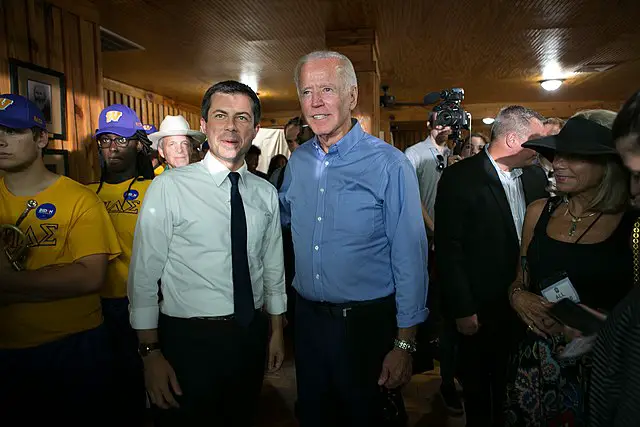The Biden administration Friday completed a weeklong push for a nearly $1 trillion infrastructure bill now before the U.S. Senate with the appearance of a third Cabinet official in metro Atlanta.
Transportation Secretary Pete Buttigieg toured the Curiosity Lab, a testing space for innovative automotive technology in Peachtree Corners, then stopped by the MARTA rail station in Doraville.
“We see here how state and local partners, public and private, already are working to create our transportation future,” Buttigieg said at the Curiosity Lab. “It’s time for the federal government to step up, too.”
The infrastructure bill includes $550 billion in new spending. The rest consists of previously approved funding.
Of the new spending, $110 billion would go toward roads and bridges, $66 billion would be spent on passenger and freight rail, $65 billion would be used to expand broadband service, and $55 billion would go toward water and sewer projects with a goal of eliminating lead pipes.
Another $39.2 billion would go to public transit systems including about $1.5 billion for MARTA and other transit agencies in Georgia, while $7.5 billion would be used for electric vehicle infrastructure including charging stations. Georgia’s share for charging stations would be about $135 million.
“Georgia plays a big role in the deployment of electric vehicles,” said state Commissioner of Transportation Russell McMurry.
McMurry cited the two EV battery manufacturing plants South Korea-based SK Innovation is building in Jackson County and the Blue Bird plant in Fort Valley that produces electric school buses.
Buttigieg said the money in the infrastructure bill going to advance the electric vehicle industry would both create American jobs and help combat climate change.
“The movement of the automotive industry toward electric is inevitable, but having it based in America is not,” he said. “This is our chance to demonstrate the old false choice of climate versus jobs will be broken in the 2020s. We have an opportunity to capture that EV future in America.”
The Senate was working through a series of proposed amendments to the infrastructure bill Friday and could vote on it as early as Saturday. While the measure enjoys significant support among Senate Republicans, it could run into trouble if and when it reaches the U.S. House of Representatives.
House Speaker Nancy Pelosi, D-Calif., is threatening to block the measure until the Senate takes up a larger $3.5 trillion bill providing funding for the nation’s “human” infrastructure needs, including education, child care and health care. The larger measure lacks Republican support.
To bolster the infrastructure bill’s chances, Health and Human Services Secretary Xavier Becerra and Treasury Secretary Janet Yellen made stops in metro Atlanta earlier this week.

Dave Williams | Capitol Beat News Service
Dave Williams is the Bureau Chief for Capitol Beat News Service. He is a veteran reporter who has reported on Georgia state government and politics since 1999. Before that, he covered Georgia’s congressional delegation in Washington, D.C.


